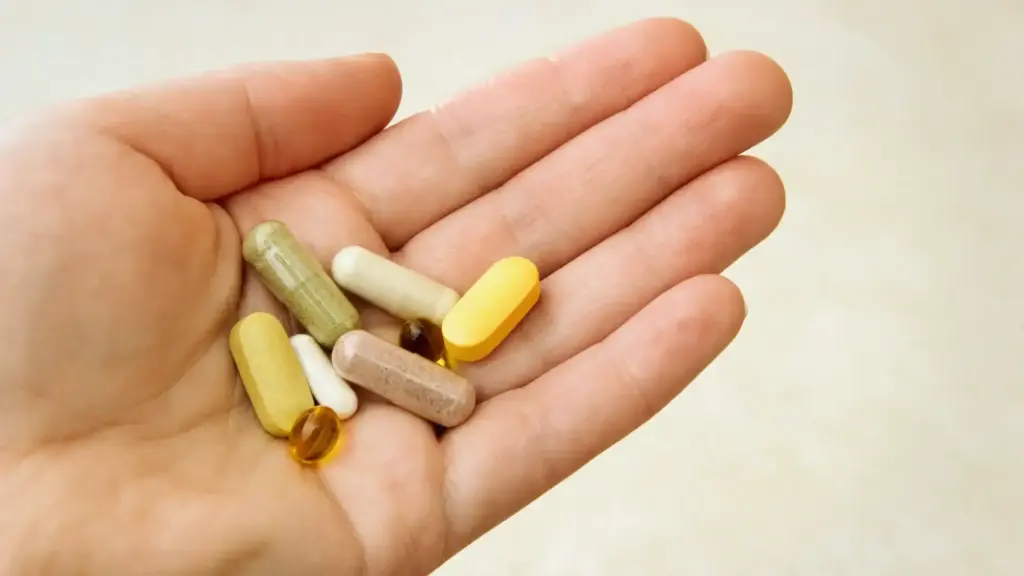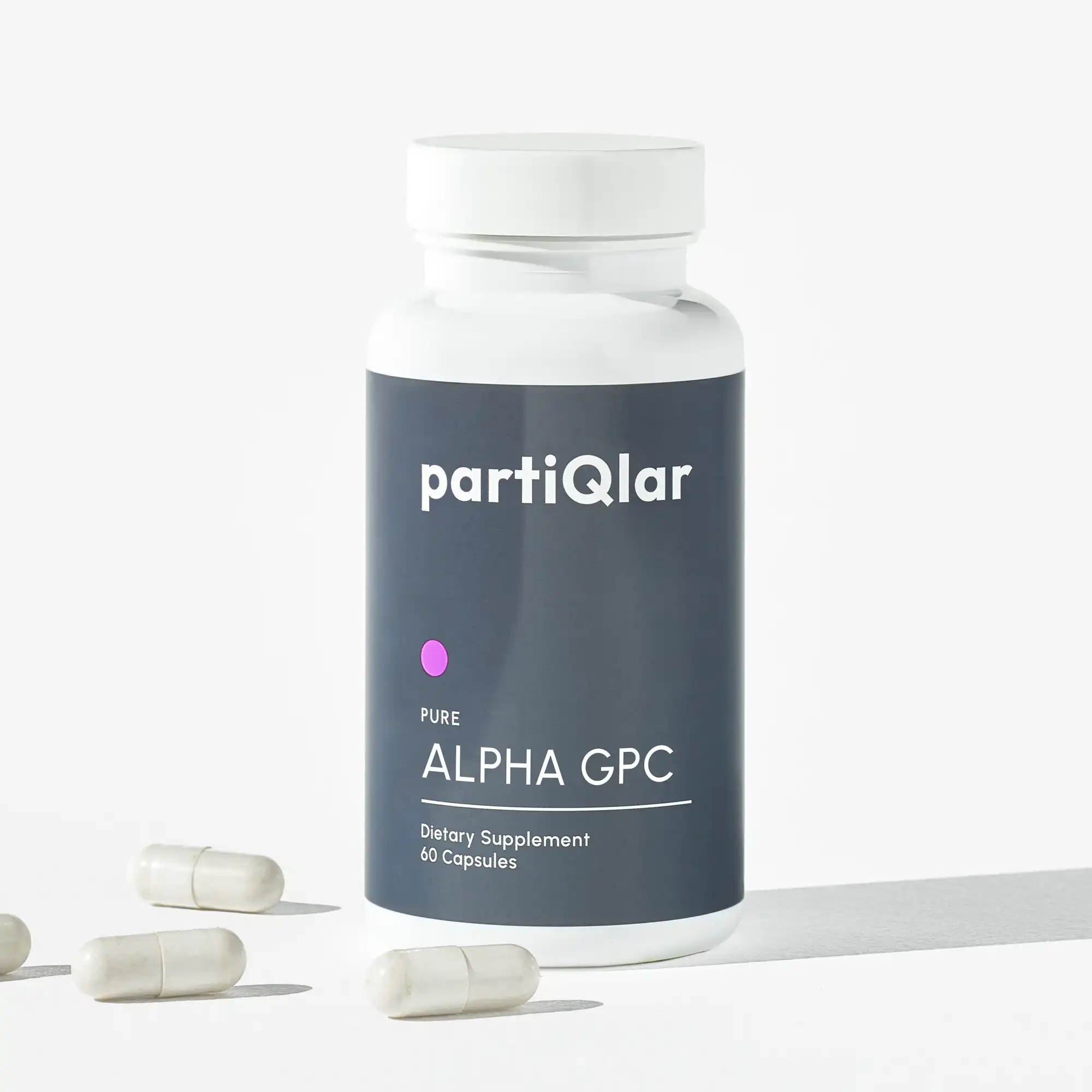Calcium alpha-ketoglutarate (Ca-AKG) is a stabilized form of alpha-ketoglutarate linked to increased bioavailability and longevity benefits observed in animal studies. Potential advantages include improved healthy aging, reduced frailty, enhanced muscle recovery, cognitive support, and even grey hair improvement.
Alpha-GPC Unveiled: A Comprehensive Guide to Boosting Brain Health, Memory, and Physical Performance
- Science
- October 17, 2024
- Jan Vincent Beltran, PhD

Related Product
Highlights
- Alpha-GPC is a naturally occurring compound that boosts the levels of acetylcholine, a neurotransmitter that is crucial for brain functions and neuron communications.
- Alpha-GPC declines with age and can result in poorer cognition, memory, and learning. Low alpha-GPC levels are associated with neurological disorders such as Alzheimer’s disease.
- Research shows that alpha-GPC supplementation may help improve cognition and memory, athletic performance, as well as mood and motivation.
- As a naturally occurring brain compound, Alpha-GPC is considered safe and well-tolerated at recommended dosages, but long-term intake is linked to a health risk of stroke in people aged 50 years old and above.

Introduction
One of the best strategies for boosting brain functions is to have an adequate amount of neurotransmitters called acetylcholine in the brain. In fact, brain development, memory and cognition, as well as muscular movement, are heavily dependent on acetylcholine. Without it, we won’t be able to think, remember, or even move. Critically, having a low acetylcholine level is associated with memory issues and muscular disorders. For example, it decreases through aging leading to being more forgetful, and drops significantly in the case of Alzheimer’s disease and dementia.
You can increase your brain’s acetylcholine production by boosting choline, its precursor. Alpha-GPC, a nootropic supplement, can provide the required choline to boost brain acetylcholine production. Hence, alpha-GPC supplementation can help sharpen your current brain power, support physical activity, and lay a strong foundation for you to navigate through the years.
Here, we’ll dive deep into what Alpha-GPC is, how it works, its benefits, potential side effects, dosage recommendations, and how it compares to other nootropics. We provide a complete guide of everything you need to know about Alpha-GPC in optimizing brain health to help you keep sharp and active at any age.
What is Alpha-GPC?
Alpha-GPC (alpha-glycerylphosphorylcholine) is a water-soluble compound composed of choline and glycerophosphate and is naturally found in the brain. Alpha-GPC contains 40% choline by weight, so a 1,000-mg dose gives 400 mg of choline. As a provider of choline, it serves as a precursor to acetylcholine, a neurotransmitter crucial for memory, learning, and muscle contractions. A brain with choline deficiency has low levels of alpha-GPC and acetylcholine which can manifest in symptoms of cognitive issues such as memory problems, difficulty concentrating, and mood disturbances like anxiety and depression. As an effective source of choline, Alpha-GPC plays a vital role in maintaining cognitive function and overall brain health.
Alpha-GPC was first discovered as a byproduct of phosphatidylcholine breakdown in the brain. In the mid-20th century, Alpha-GPC’s cognitive-enhancing properties were identified, and since then, it has been extensively studied for its role in improving memory, learning, and overall brain function.
While it is naturally present in small amounts in the brain and various foods, the concentrated form of Alpha-GPC used in commercial supplements is typically derived from egg, soy or sunflower lecithin.
But beyond these traditional uses, recent findings uncover even more about berberine’s potential, including berberine’s positive effects on weight management and blood sugar regulation. With promising benefits and a long history of safe use, berberine is a compound worth exploring for those seeking natural ways to improve their health.
How does Alpha-GPC work?
Alpha-GPC works primarily by boosting the acetylcholine levels in the brain – a crucial brain chemical responsible for memory, attention, and muscle control. By supplying a direct source of choline, Alpha-GPC promotes the brain’s production of acetylcholine which acts as a chemical messenger that enhance the communication between brain cells, leading to sharper focus, better memory retention, and improved overall brain function.
Mechanism of Action
Here’s how Alpha-GPC improve cognitive function. When you take Alpha-GPC supplement, it quickly absorbs into the bloodstream and efficiently crosses the blood-brain barrier. Once inside the brain, it provides a direct source of choline, essential for producing the neurotransmitter acetylcholine which has a key role in memory, attention, and overall communication of neurons¹. Boosted levels of acetylcholine correspond with enhanced brain’s ability to process and retain information, which can help you stay sharp and focused.
But that’s not all—Alpha-GPC also supports the production of phospholipids, vital molecular components of our nerves’ cell membranes. This helps maintain the structure and fluidity of the brain cells’ membranes, further optimizing brain function and protecting against cognitive decline. In essence, Alpha-GPC works on multiple fronts to keep your brain healthy, active, and ready for whatever challenges come your way.
Comparison with other Nootropic Choline Sources
Alpha-GPC is often compared to other nootropics. There are multiple forms of choline supplements on the market aside from alpha-GPC, including citicoline (CDP-choline), choline bitartrate, choline citrate, choline chloride, and phosphatidylcholine. They may all provide choline but they generally differ in the % of choline that they can provide, properties like bioavailability, potential neuroprotective efficacy, other benefits and side effects, as well as costs.
Here’s a breakdown of how these various choline supplements differ:
Nootropic Supplement | Choline by weight | Pros | Cons |
Alpha-GPC | 40% |
|
|
Citicoline (CDP-choline) | 18% |
|
|
Choline bitartrate | 41% |
|
|
Choline citrate | 50% |
|
|
Choline chloride | 74% |
|
|
Phosphatidylcholine | 13% |
|
|

Benefits of Alpha-GPC
Alpha-GPC’s versatile benefits make it a valuable addition to your nootropic stack, whether you’re aiming to sharpen your cognitive skills, improve your physical performance, or aid with specific mental health conditions.
As a nootropic and physical enhancer, Alpha-GPC benefits include:
Cognitive Function and Memory Enhancement
Alpha-GPC is well-regarded for its ability to boost cognitive function and improve memory. Research indicates that it can enhance memory recall, increase attention span, and improve learning abilities. This makes Alpha-GPC an excellent choice for anyone looking to maintain or improve cognitive health, from students to professionals to seniors.
But what’s most interesting is its application in patients with existing neurological conditions. A recent systematic review and meta-analysis published at the Journal of Alzheimer’s Disease (2023)² reveals that alpha-GPC significantly improved cognition, behavior, and functional outcomes among patients with adult-onset neurological disorders.
Benefits for Athletes
Alpha-GPC is not just for the brain—it also has significant benefits for athletes. Research has shown that Alpha-GPC can enhance physical performance by promoting the release of growth hormone and increasing power output.
For example, one study suggests that 6-day 600 mg alpha-GPC supplementation improves mid-thigh pulls compared to placebo³. It also helps improve muscle contraction efficiency and brain-muscle coordination, which are crucial for athletic performance. With growing interest in Alpha-GPC for athletes, it is becoming a popular addition to body-building regimens.
A study on trained men⁴ shows that a 600-mg alpha-GPC pre-workout dose taken 90 minutes before resistance training showed an increased growth hormone (GH) secretion which peaked 30 minutes post-exercise. As a body-building hormone, GH can promote more muscle building, faster recovery, and improved strength which can contribute to increased performance. Meanwhile, Huberman Alpha-GPC protocol suggests 300mg alpha-GPC, 30-60 minutes before key workouts, citing its ability to promote acetylcholine release for improved memory, attention, and skeletal muscle contractions that can lead to increased power output for athletes.
Impact on ADHD and Depression
Emerging research also points to the potential benefits of Alpha-GPC in managing ADHD and depression. With increased acetylcholine levels, Alpha-GPC can help improve attention span, concentration, and focus; hence, it may be worth testing in individuals with ADHD.
Furthermore, its role in enhancing dopamine receptor sensitivity could offer some relief from depression symptoms. In 2021, Japanese scientists showed that alpha-GPC can increase motivation in healthy volunteers⁵, which may be a promising application for depression; however, until now, direct evidence is lacking. Further studies are needed to confirm alpha-GPC’s role in modulating mental health.
Dosage and Administration
The brain shrinks by about 5% per decade after the age of 40 and this rate potentially accelerates after age 60⁶. This reduction in brain volume is linked to cognitive decline and physical frailty, highlighting the importance of preventative strategies to support brain health. Alpha-GPC could be part of that strategy, but finding the right dosage is key to maximizing its benefits while minimizing any potential side effects.
Recommended Dosages and Forms
Alpha-GPC comes in several forms, including capsules and powders, allowing for flexibility based on personal preferences. The optimal dosage depends on your specific needs and goals, and your doctor can craft the best personalized advice for you.
In general, alpha-GPC dose can be modified according to the purpose:
- For Athletic Performance: Based on collective studies of alpha-GPC and physical performance, a dosage of around 300–600 mg, about 30–60 minutes before exercise may be more beneficial for athletes aiming to enhance power output. For example, in this study⁷, a 600-mg dose was associated with enhanced isometric strength in a week.
- For Cognitive Enhancement: Most studies used a common dosage of around 1,200 mg per day, given in three doses of 400 mg for improving cognitive decline⁸. As indicated in this study, this dosage is more suitable for people with adult-onset cognitive dysfunction, otherwise, a smaller dose is more recommended to support memory and cognitive function without leading to side effects.
How to Take Alpha-GPC
For best results, experts recommend that alpha-GPC be taken on an empty stomach to maximize absorption; however, it can also be taken with a meal/snack if you experience stomach upset.
It can also be combined, or “stacked,” with other nootropics like L-theanine or caffeine to enhance focus and mental clarity, providing a potential synergistic effect. In Huberman’s supplement stack for focus and brain health, he included alpha-GPC in addition to fish oil (1-1g EPA every day), Rhodiola rosea (1,200 mg daily divided in three doses), garlic extract (600 mg daily), L-tyrosine (500-1000 mg 30 mins before mental or physical work), phenylethylamine (500 mg once a week or every 2 weeks), glutamine (1-10g per day), and creatine (5g in the morning or post-workout).
Garlic extract supplementation is especially recommended if you are concerned about the potential of alpha-GPC to increase TMAO levels (which is associated with cardiovascular risks). Studies have demonstrated the potential of garlic extract in decreasing TMAO levels and reducing cardiovascular risks.

Side Effects and Safety
Alpha-GPC is generally considered safe for most people, but some may experience side effects, especially at higher doses.
Common and Rare Side Effects
Common side effects of Alpha-GPC are usually mild and occur when dosages are too high, including:
- Headache
- Dizziness
- Stomach upset
- Heartburn
In rare cases, side effects might include insomnia, confusion, and nervousness, but these are uncommon.
Precautions and Contraindications
Certain groups should approach Alpha-GPC with caution. Individuals with bipolar disorder or those on medications for blood pressure should consult with a healthcare provider before starting Alpha-GPC. Pregnant or breastfeeding women are also advised to avoid Alpha-GPC unless specifically recommended by a healthcare professional.
People also ask, can Alpha-GPC cause strokes? Based on a 2021 clinical study⁹, which includes 12 million individuals aged 50 years or older, long-term Alpha-GPC intake was associated with a 10-year incident stroke risk in a dose-responsive manner. However, studies also checked the use of alpha-GPC for several months with no side effects. To counteract the risk, you may use alpha-GPC in moderation or not daily; you can also find a personal minimum dosage that works for you. You may also partner it up with garlic supplements as this may protect against stroke risk while also improving cognitive and motor functions¹⁰.
And if you’re concerned about whether alpha-GPC raises blood pressure, one study showed that alpha-GPC may even help regulate heart rate and blood pressure after strenuous activity¹¹.
Finding Quality Alpha-GPC Supplements
With promising research on alpha-GPC’s impact on brain functions, you can give it a try too. But, how to choose high-quality alpha-GPC, and what are the best brands for alpha-GPC? Selecting the best Alpha-GPC supplement in the market is crucial for achieving desirable effects.
Here are some tips for choosing reputable Alpha-GPC brands:
- Manufacturing standards: Look for brands that manufacture their products in cGMP-compliant facilities and that provide third-party testing results to ensure the purity and potency of their products. This is generally found on the company website.
- Concentration and Purity: Alpha-GPC Dosages are indicated on the product labels and make sure to check it out. Opt for products that offer a high concentration of Alpha-GPC comparable to human clinical studies for optimal results. For instance, Alpha-GPC 50 and Alpha-GPC 99 are both available in the market with ~50% and ~99% alpha-GPC purity, respectively. Alpha-GPC 50 has less concentration, reduced cost, and is more common, but would have less efficacy than 99%.
- Brand Reputation: Choose brands with positive reviews and a solid reputation in the market. Check the product website for customer reviews to gain insights on consistent feedback of users which are real-world experiences that can help you decide.
Meanwhile, these are also the same factors that influence the cost of Alpha-GPC supplements—the higher the quality, the higher the price. Typically, capsules may range from $20 to $50 for a month’s supply (one bottle). Often a more cost-effective option, powders typically range from $10 to $30 monthly supply, but it’s less preferred due to its inherent bitterness. Alpha-GPC supplements are widely available at health food stores, online retailers, and specialty supplement shops.

Conclusion
Weak cognitive functions are fundamental barriers to productivity, efficiency, and overall mental well-being.
Cognitive enhancement is a goal many of us strive for. As a natural acetylcholine-boosting compound in the brain function, Alpha-GPC is a versatile nootropic with several benefits for both cognitive function and physical performance. Whether you’re looking to boost your memory, enhance your focus, or improve your physical capabilities, Alpha GPC could be a valuable addition to your supplement regimen. With the right dosage and administration, Alpha GPC may help you elevate your brain and body in your battle against brain aging-related decline.
Start your journey towards better cognitive and physical health today — start with alpha-GPC!
FAQ’s
Q1: How long does Alpha-GPC take to work?
Alpha-GPC typically begins to work within 30 to 60 minutes after ingestion, depending on individual metabolism and dosage. Its effects on cognitive enhancement, such as improved focus and memory recall, may be noticeable within this timeframe or longer use. For athletic performance, a study shows that growth hormone secretion peaks around 30 minutes post-exercise when it was taken as a pre-workout supplement which can promote muscle building, faster recovery, and improved strength, while increased power output became evident about 6 days with daily use¹².
Q2: What depletes choline?
Mostly due to poor diet, low choline levels can also be depleted by other factors like excessive alcohol consumption and certain genetic variations affecting choline metabolism. High-intensity exercise and stress may also increase choline demand. Additionally, conditions like liver disease or nutrient deficiencies can impair choline synthesis, leading to lower levels in the body.
Q3: Does Alpha-GPC affect sleep?
Alpha-GPC generally does not have a significant impact on sleep for most people. However, in rare cases, some individuals might experience sleep disturbances, particularly if taken close to bedtime due to its potential stimulating effects. To avoid this, it’s advisable to take Alpha-GPC earlier in the day and monitor individual responses.
Explore Products
Related Articles
This blog post discusses the FDA's recent decision to no longer classify NMN as a dietary supplement, examining the implications for its availability and safety in the market.
Discover the power of berberine, a natural compound known for its weight loss and blood sugar control benefits. Learn how it activates metabolism and supports overall health, with practical tips on dosage and supplementation.



